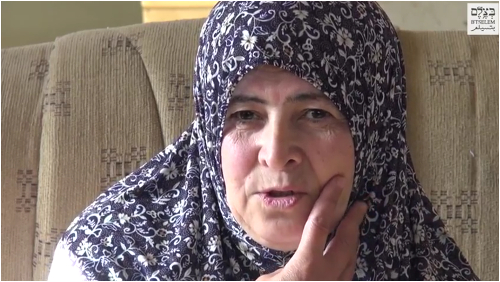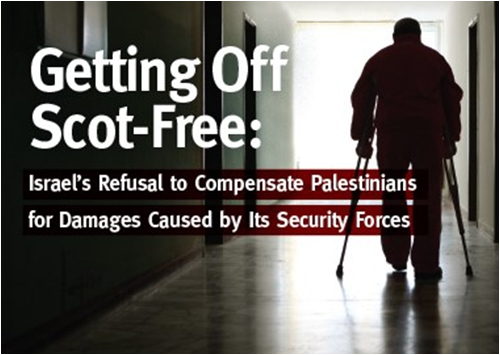Imagine that one minute can change your whole life. Yesterday you played with your children in the yard and greeted your neighbor on the balcony while thinking about dinner. In the evening you kiss your children goodnight, clean the dishes, take a hot bath and relax with your husband in front of the TV. The next day as you are looking outside your window a soldier shoots you in the face.
Basmah Muhammad Taleb Manur is the mother of 10 children, a housewife, citizen of Nablus and disabled for the rest of her life. “Now I rely on other people for everything. That’s what hurts the most.” No compensation can replace the pain she suffered or give back her autonomy and the ability to be the mother for her kids.

Basmah Mansur's life changed from one day to another. Picture: B'Tselem
According to the International Human Rights Law (IHL), binding for all states, Israel has to provide Basmah financial compensation so that she can get the medical treatment and physiotherapy she depends on. The law says that states are obligated to compensate individuals who are harmed in an act of human rights violation. From September 2000 till November 2016 4,856 Palestinians were killed by Israel’s Security Forces, who were not taking part in hostilities. Between 2012 and 2016 just 18 lawsuits for compensation have been successfully negotiated with the victims receiving 3.8 million shekels. Between 1997 and 2001, that amount was 568 percent higher.
New B'tselem Report Reveals Israeli Evasion of Responsibility
The human rights organization B’Tselem published their new report “Getting off Scot-Free: Israel’s Refusal to Compensate Palestinians for Damages Caused by its Security Forces”. The author, Yael Stein, describes how the State of Israel slowly exempts itself from its responsibility to pay compensation by “expanding immunity from liability and establishing procedural and evidential rules to hinder Palestinians in filling lawsuits.”

Cover of the report "Getting Off Scot-Free" published by B'Tselem
The Committee of Ex Gratia Payments established by the Ministry of Defense is responsible for the compensation payments from the State of Israel. Based on the legislation given by the Israeli Torts Law (based on British Mandatory legislation), the three-member committee has the power to decide the victim’s future. Lawsuits submitted through “persons whom there is reasonable cause to believe” will be rejected and just cases of bodily harm have little prospect of success. A claim must be reported to the Ministry of Defense within 60 days after the incident occurred. If the medical condition doesn’t allow it, the authority gives you 30 days after your condition makes it possible. Within one year the case will be discussed in the committee.
International Human Rights Law Requires Occupying States to Pay Compensation
The IHL states that an “occupying state has to protect the residents of the occupying territory and ensure their safety and wellbeing”. The Israeli Torts law ensures this principle and grants that victims of warfare activity are entitled to receive payments from the State. “It is an illusion of a working system, on paper Palestinians can find it but not in the daily procedures”, explains Stein. The scope of interpretation for the term “warfare activity” has been used by the state since 1997 to find a loophole to escape the duty for paying. Several changes and exceptions have made this possible.
It started 1997, when a draft bill was signed, stating that all incidents occurring during the first intifada can’t be defined as “warfare activities”. Besides that, new criteria for claiming a lawsuit have been added: the victim must now state a reason why the incident occurred (which they mostly don’t know themselves) and for persons who are involved or convicted in terror activities a lawsuit becomes impossible. In Amendment 4, from 2002, the term “warfare activity” was officially defined as “any act of fighting terrorism, hostilities or uprising and any act taken to defend terrorism (…) in the face of danger of life and limb”. With Amendment 7 in 2005, the state was given absolute immunity for all accidents during the Second Intifada and exempted from all cases caused in conflict zones or by national enemies. The Minister of Defense got also full discretion to declare any area as a conflict zone. This allowed Shaul Mofaz, who held this position until 2006, to classify most of the West Bank and Gaza as a conflict zone. In 2012 the definition of “warfare activity” was expanded and the condition that the act has to be carried out “in face of danger to life and limb” was deleted. Besides that, a definition of enemy nationals as “residents of areas outside Israel who was declared enemy territory by governmental decree” made it impossible for victims form the Gaza Strip, after the Israeli withdrawal 2005, to initiate a lawsuit for compensation. Step by step the government achieved a situation where it “can do whatever they want, without consequences”, as Stein explains it.
Palestinians Face Numerous Obstacles to Bringing their Case to Court
Palestinians must face numerous other problems when bringing their lawsuit to court, apart from the obvious cultural differences and the language barrier. First the claims will be filed in courts in Jerusalem or Beer Sheba. Therefore the complainant needs to enter Israel with a special permit, which requires a long process. For people in Gaza it is worse. Since 2007 it has been forbidden to enter Israel and legal proceedings are no exception. On the other hand it is difficult for lawyers from Israel to see their client. Another burden is the filing fees, which Palestinians have to deposit as a guarantee in Israeli courts to ensure the payment of defendant expenses. The amount can range between ten and one hundred thousand shekels. If the complainant is not able to pay, the case is dismissed.
In 2005 the Israeli government started (without legal grounds) to compensate their victims themselves and expected the PA to follow. The Israelis argued that they can’t be liable for all damages created by war. Since then the PA offers Palestinian victims some money to get at least the most necessary medical treatments. International organizations, other Arab countries and Islamic charities also offer their help.
The fight for justice in achieving compensation for involuntary victims in the conflict between Israel and Palestine has become a rough journey with little prospect of success. But ironically in the dispute on offering financial help, Israel recognizes Palestine as a state that should “assume the damages it incurs”.
Download the report:http://www.btselem.org/publications
